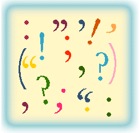Grammar
1. The entire system of a language, including its syntax, morphology, semantics, and phonology.
2. Popularly, the structural rules of a language, including those relating to syntax and possibly morphology, but excluding vocabulary (the semantic system) and phonology.
3. A book containing rules and examples of grammar (particularly in sense 2).
4. An individual's application of the rules, as in This novel is full of bad grammar.
Descriptions
- Several adjectives are attached to the word grammar.
Traditional grammar can cover many periods. It is often used (as in this book) to mean the grammar of the eighteenth, nineteenth, and early twentieth centuries, which was often based on, or in the tradition of, Latin grammar. It is contrasted with the grammatical analysis that began in the nineteenth century but came to fruition in the twentieth, which depends on linguistic research into actual usage.
- Pedagogical grammar (or teaching grammar) is variously used to mean grammar or a grammar for teachers or for learners.
- Reference grammar may be restricted to meaning ‘a large comprehensive work of grammar’, but can be extended to include smaller books intended solely for reference purposes.
- Theoretical grammar is concerned with language in general, rather than with an individual language.
Comparisons
Compare COMPARATIVE (2), DESCRIPTIVE (1), GENERALIZED PHRASE-STRUCTURE GRAMMAR, GENERATIVE GRAMMAR, GOVERNMENT-BINDING THEORY, PHRASE- structure grammar, PRESCRIPTIVE, RELATIONAL grammar, STRATIFICATIONAL GRAMMAR, STRUCTURALISM, SYSTEMIC GRAMMAR, TRANSFORMATIONAL GRAMMAR, WORD GRAMMAR.
